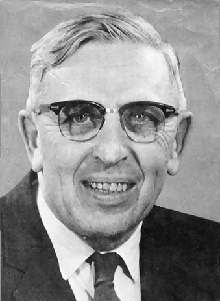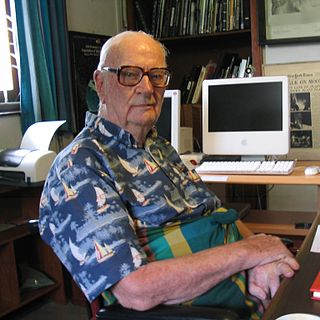
Hard science fiction is a category of science fiction characterized by an emphasis on scientific accuracy. The term was first used in print in 1957 by P. Schuyler Miller in a review of John W. Campbell's Islands of Space in the November issue of Astounding Science Fiction. The complementary term soft science fiction, formed by analogy to hard science fiction, first appeared in the late 1970s. The term is formed by analogy to the popular distinction between the "hard" (natural) and "soft" (social) sciences. Science fiction critic Gary Westfahl argues that neither term is part of a rigorous taxonomy; instead they are approximate ways of characterizing stories that reviewers and commentators have found useful.

Lyon Sprague de Camp, better known as L. Sprague de Camp, was an American writer of science fiction, fantasy and non-fiction. In a career spanning 60 years, he wrote over 100 books, including novels and works of non-fiction, including biographies of other fantasy authors. He was a major figure in science fiction in the 1930s and 1940s.

L. E. Modesitt Jr. is an American science fiction and fantasy author who has written over 70 novels. He is best known for the fantasy series The Saga of Recluce. By 2015 the 18 novels in the Recluce series had sold nearly three million copies.
Publication of comic strips and comic books focusing on science fiction became increasingly common during the early 1930s in newspapers published in the United States. They have since spread to many countries around the world.

Horace Leonard "H. L." Gold was an American science fiction writer and editor. Born in Canada, Gold moved to the United States at the age of two. He was most noted for bringing an innovative and fresh approach to science fiction while he was the editor of Galaxy Science Fiction, and also wrote briefly for DC Comics.
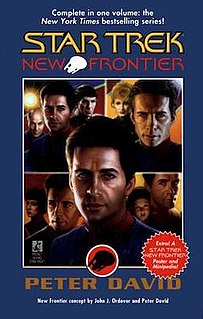
Star Trek: New Frontier is a series of interlinked novels written by Peter David, published by Pocket Books 1997 to 2015. New Frontier is the first Star Trek tie-in fiction property not to be based on a television series. The series was created by John J. Ordover.

Weird fiction is a subgenre of speculative fiction originating in the late 19th and early 20th centuries. John Clute defines weird fiction as a "Term used loosely to describe Fantasy, Supernatural Fiction and Horror tales embodying transgressive material". China Miéville defines weird fiction thus: "Weird Fiction is usually, roughly, conceived of as a rather breathless and generically slippery macabre fiction, a dark fantastic often featuring nontraditional alien monsters ." Discussing the "Old Weird Fiction" published in the late 19th and early 20th centuries, Jeffrey Andrew Weinstock says, "Old Weird fiction utilises elements of horror, science fiction and fantasy to showcase the impotence and insignificance of human beings within a much larger universe populated by often malign powers and forces that greatly exceed the human capacities to understand or control them." Weird fiction either eschews or radically reinterprets ghosts, vampires, werewolves, and other traditional antagonists of supernatural horror fiction. Weird fiction is sometimes symbolised by the tentacle, a limb-type absent from most of the monsters of European folklore and gothic fiction, but often attached to the monstrous creatures created by weird fiction writers such as William Hope Hodgson, M. R. James, and H. P. Lovecraft. Weird fiction often attempts to inspire awe as well as fear in response to its fictional creations, causing
commentators like Miéville to say that weird fiction evokes a sense of the numinous. Although "weird fiction" has been chiefly used as a historical description for works through the 1930s, the term has also been increasingly used since the 1980s, sometimes to describe slipstream fiction that blends horror, fantasy, and science fiction.
Libertarian science fiction is a subgenre of science fiction that focuses on the politics and social order implied by right libertarian philosophies with an emphasis on individualism and private ownership of the means of production—and in some cases, no state whatsoever.
The first Golden Age of Science Fiction, often recognized in the United States as the period from 1938 to 1946, was an era during which the science fiction genre gained wide public attention and many classic science fiction stories were published. In the history of science fiction, the Golden Age follows the "pulp era" of the 1920s and 1930s, and precedes New Wave science fiction of the 1960s and 1970s. The 1950s are a transitional period in this scheme; however, Robert Silverberg, who came of age in the 1950s, saw that decade as the true Golden Age.
The 2nd World Science Fiction Convention (Worldcon), also known as Chicon I, was held September 1–2, 1940, at the Hotel Chicagoan in Chicago, Illinois, United States. The event had 128 participants.
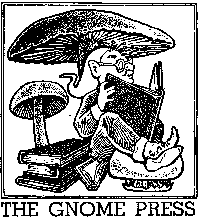
Gnome Press was an American small-press publishing company primarily known for publishing many science fiction classics. Gnome was one of the most eminent of the fan publishers of SF, producing 86 titles in its lifespan — many considered classic works of SF and Fantasy today. Gnome was important in the transitional period between Genre SF as a magazine phenomenon and its arrival in mass-market book publishing, but proved too underfunded to make the leap from fan-based publishing to the professional level. The company existed for just over a decade, ultimately failing due to inability to compete with major publishers who also started to publish science fiction. In its heyday, Gnome published many of the major SF authors, and in some cases, as with Robert E. Howard's Conan series and Isaac Asimov's Foundation series, was responsible for the manner in which their stories were collected into book form.

The Continent Makers and Other Tales of the Viagens is a 1953 collection of science fiction stories by American writer L. Sprague de Camp, the fifth book in his Viagens Interplanetarias series. It was first published in hardcover by Twayne Publishers, and in paperback by Signet Books in 1971 with a cover by illustrator Bob Pepper. An E-book edition was published by Gollancz's SF Gateway imprint on September 29, 2011 as part of a general release of de Camp's works in electronic form. It has also been translated into Portuguese, Dutch, and Italian. The pieces were originally published between 1949 and 1951 in the magazines Astounding Science-Fiction, Startling Stories, Future Combined with Science Fiction, and Thrilling Wonder Stories.

Science-Fiction Handbook, subtitled The Writing of Imaginative Fiction, is a guide to writing and marketing science fiction and fantasy by L. Sprague de Camp, "one of the earliest books about modern sf." The original edition was published in hardcover by Hermitage House in 1953 as a volume in its Professional Writers Library series. A revised edition, by L. Sprague de Camp and Catherine Crook de Camp, titled Science Fiction Handbook, Revised, was published in hardcover by Owlswick Press in 1975 and as a trade paperback by McGraw-Hill in 1977. An E-book version of the revised edition was published by Gollancz's SF Gateway imprint on April 30, 2014.
Everett Franklin Bleiler was an American editor, bibliographer, and scholar of science fiction, detective fiction, and fantasy literature. In the late 1940s and early 1950s, he co-edited the first "year's best" series of science fiction anthologies, and his Checklist of Fantastic Literature has been called "the foundation of modern SF bibliography". Among his other scholarly works are two Hugo Award–nominated volumes concerning early science fiction—Science-Fiction: The Early Years and Science-Fiction: The Gernsback Years—and the massive Guide to Supernatural Fiction.
The 42nd World Science Fiction Convention (Worldcon), also known as L.A.con II, was held August 30–September 3, 1984, at the Anaheim Hilton and the Anaheim Convention Center in Anaheim, California, United States.
David McIlwain better known by his pen name, Charles Eric Maine, was an English writer best known for several science fiction serials published in the 1950s and 1960s. He also wrote detective thrillers under the pen names Richard Rayner and Robert Wade.
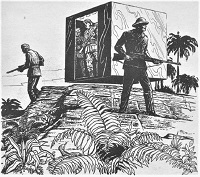
"A Gun for Dinosaur" is a time travel science fiction story written by L. Sprague de Camp as part of his Rivers of Time series. It tells the story of four men who travel into the past to hunt and kill dinosaurs.
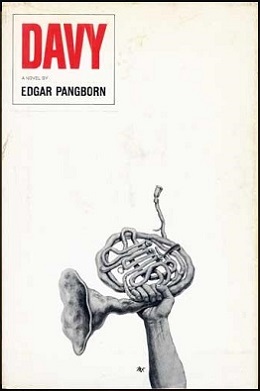
Davy is a post-apocalyptic science fiction novel by American writer Edgar Pangborn, nominated for the 1965 Hugo Award. It is set in the Northeastern United States some centuries after an atomic war ended high-technology civilization, with some scenes on an unnamed Atlantic island.

"The Stolen Dormouse" is a science fiction novella by American writer L. Sprague de Camp. It was first published as a serial in the magazine Astounding Science-Fiction for April and May, 1941 and first appeared in book form in de Camp's collection Divide and Rule. The story has also appeared in the anthologies Astounding Stories: The 60th Anniversary Collection, and The Best of Astounding: Classic Short Novels from the Golden Age of Science Fiction.



